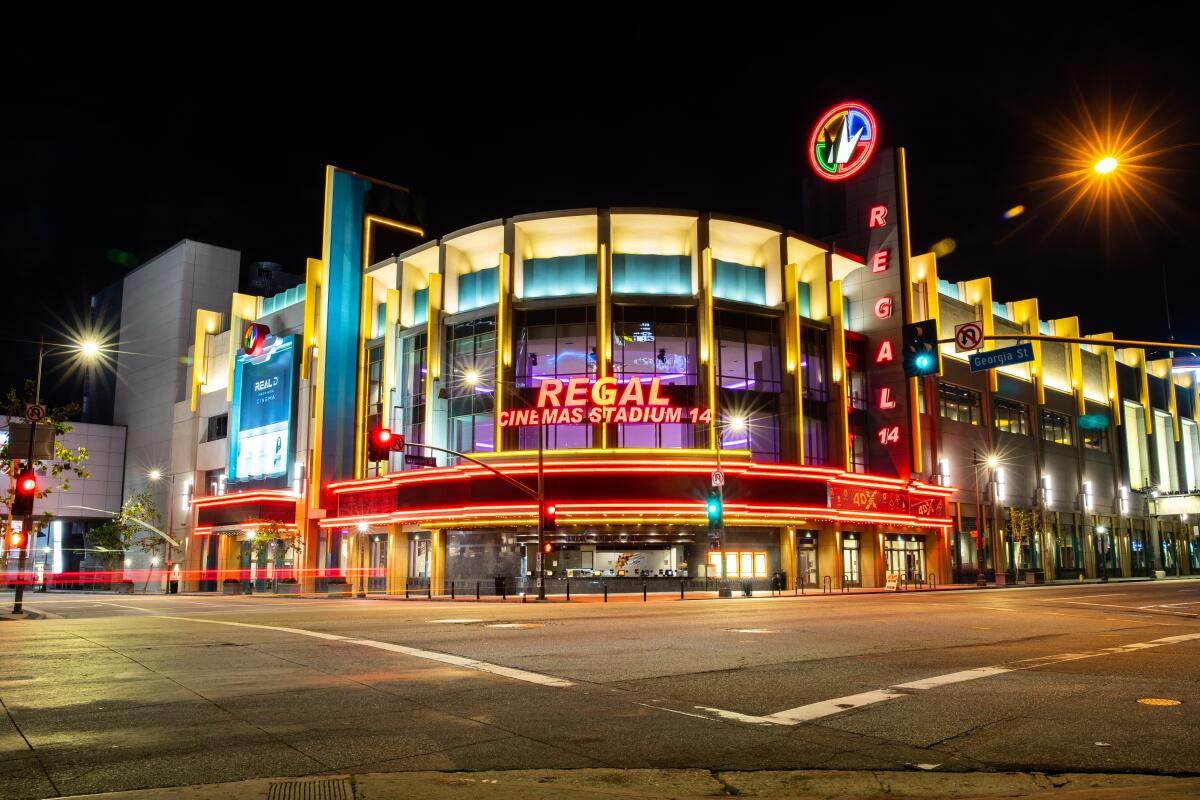Hollywood fears movie theaters ‘may not survive’ COVID-19 pandemic

After more than six months of struggles amid the COVID-19 pandemic, Hollywood issued a dire message about the state of the movie theater industry — the nation’s cinemas “may not survive” without help.
Groups representing movie studios, theater owners and directors on Wednesday called on Washington lawmakers to provide “specific relief” for film exhibitors, saying that nearly 70% of small and mid-sized theater companies would be forced to declare bankruptcy or go out of businesses without government assistance.
Dozens of famous filmmakers, including Judd Apatow, James Cameron, Greta Gerwig, Christopher Nolan, Jordan Peele, Wes Anderson, Clint Eastwood and Ang Lee, signed a letter calling on the federal government to provide support for the industry, which remains shuttered in much of the country.
The National Assn. of Theatre Owners (NATO), the Washington-based organization that stumps for exhibitors, sent the letter, which was addressed to Senate Majority Leader Mitch McConnell (R-Ky.), Minority Leader Charles Schumer (D-N.Y.), House Speaker Nancy Pelosi (D-San Francisco) and House Republican leader Kevin McCarthy (R-Bakersfield). The Motion Picture Assn., the lobby representing the major film studios, joined NATO in signing the letter, as did the Directors Guild of America.
“Absent a solution designed for their circumstances, theaters may not survive the impact of the pandemic,” the industry groups said in the letter. “Cinemas are an essential industry that represent the best that American talent and creativity have to offer. But now we fear for their future.”
Movie theaters slowly began to reopen across the country in anticipation of Nolan’s “Tenet” in the U.S. before Labor Day weekend. But after “Tenet” reported modest domestic box office results, studios including Walt Disney Co. and Universal Pictures have continued to delay big movies, fearing not enough cinemas are open to support expensive blockbusters, and too few moviegoers are ready to return. Last week, Disney moved multiple titles including “Black Widow” and Steven Spielberg’s “West Side Story” to later dates. Warner Bros. shifted “Wonder Woman 1984” from October to Christmas.
Theaters remain closed in markets representing roughly 30% of annual box office sales, including Los Angeles County and New York, the nation’s two biggest locales for filmgoing. Neither jurisdiction has said when theaters may be able to return. That has caused problems for theater chains that need new movies in order to operate profitably. Some have reduced hours to stem losses.
According to the industry groups, 93% of exhibitors saw their revenue plummet 75% or more in the second quarter, compared with the same period of time last year. In the U.S., the theater industry employs 150,000 people, many of whom are part time and hourly. If the status quo continues, two-thirds of those jobs could vanish, the groups warned. “Our country cannot afford to lose the social, economic, and cultural value that theaters provide,” the letter said.
The industry leaders called on the elected officials to respond by allocating unspent funds from the CARES Act, the stimulus package President Trump signed into law in March, to programs designed for industries including movie theaters. They also suggesting enacting additional measures such as the RESTART Act, a Congressional bill that would help venues and other businesses by extending and bolstering the Paycheck Protection Program.
“These solutions would fulfill Congress’ intent in helping severely distressed sectors of the economy and ensure that our resources are focused on the industries that need them the most,” the letter said.
More to Read
Inside the business of entertainment
The Wide Shot brings you news, analysis and insights on everything from streaming wars to production — and what it all means for the future.
You may occasionally receive promotional content from the Los Angeles Times.











